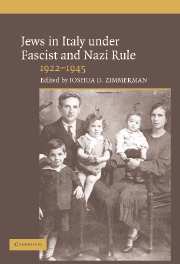Book contents
- Frontmatter
- Contents
- Acknowledgments
- Abbreviations
- List of Contributors
- Map 1. The Jews of Italy, 1938
- Map 2. Principal Centers of Anti-Jewish Persecution, 1938–1943
- Introduction
- Part One ITALIAN JEWRY FROM LIBERALISM TO FASCISM
- Part Two RISE OF RACIAL PERSECUTIONS
- Part Three CATASTROPHE – THE GERMAN OCCUPATION, 1943–1945
- Part Four THE VATICAN AND THE HOLOCAUST IN ITALY
- Part Five AFTERMATH: CONTEMPORARY ITALY AND HOLOCAUST MEMORY
- 16 The Rescued and the Rescuers in Private and Public Memories
- 17 Return of the Repressed: Italian Film and Holocaust Memory
- 18 The Secret Histories of Roberto Benigni's Life Is Beautiful
- Index
- Plates A–D
17 - Return of the Repressed: Italian Film and Holocaust Memory
Published online by Cambridge University Press: 22 September 2009
- Frontmatter
- Contents
- Acknowledgments
- Abbreviations
- List of Contributors
- Map 1. The Jews of Italy, 1938
- Map 2. Principal Centers of Anti-Jewish Persecution, 1938–1943
- Introduction
- Part One ITALIAN JEWRY FROM LIBERALISM TO FASCISM
- Part Two RISE OF RACIAL PERSECUTIONS
- Part Three CATASTROPHE – THE GERMAN OCCUPATION, 1943–1945
- Part Four THE VATICAN AND THE HOLOCAUST IN ITALY
- Part Five AFTERMATH: CONTEMPORARY ITALY AND HOLOCAUST MEMORY
- 16 The Rescued and the Rescuers in Private and Public Memories
- 17 Return of the Repressed: Italian Film and Holocaust Memory
- 18 The Secret Histories of Roberto Benigni's Life Is Beautiful
- Index
- Plates A–D
Summary
As an observer of contemporary Italian culture, I have been struck by the recent outpouring of texts and films on the subject of the Shoah, evidence of what Fabio Girelli-Carasi sees as the belated emergence of a Jewish discourse in the Italy of today. During my years as a student in the late 1960s and early 1970s, I was aware of a distinct reluctance on the part of writers and directors to confront this chapter in Italian history. Of course, there was Giorgio Bassani, but he was “ghettoized” by the intellectual Left for a perceived lack of ideological engagement – a failure to represent the possibility of an activist response to Fascism and the residual injustices of the postwar period. I was dimly aware of the achievements of Primo Levi, but that awareness was clouded by a kind of respectful reticence, almost a sense of embarrassment, about his writings on the part of the critical establishment. This discomfort took the form of taxonomic indecision – how to characterize this body of writing? Was it literature or history, autobiography or legal brief – in other words, how do we label and accommodate the text of witness? Such unease, of course, reflected a far deeper problem – the Italian hesitance to tell the Holocaust story at all, the reluctance to face what the eminent Italian director, Ettore Scola, would call “a passage little frequented, and hardly edifying, of our History.”
- Type
- Chapter
- Information
- Jews in Italy under Fascist and Nazi Rule, 1922–1945 , pp. 321 - 329Publisher: Cambridge University PressPrint publication year: 2005
- 2
- Cited by



